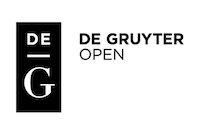Previous volumes:
System dynamics models as decision-making tools in agritourism
Tadeja JERE JAKULIN
pp. 5-10
ABSTRACT
Agritourism as a type of niche tourism is a complex and sofly defned phaenomenon. Te demands for fast and integrated decision regarding agritourism and its interconnections with environment, economy (investments, trafc) and social factors (tourists) is urgent. Many different methodologies and methods master sofly structured questions and dilemmas with global and local properties. Here we present methods of systems thinking and system dynamics, which were frst brought into force in the educational and training area in the form of different computer simulations and later as tools for decision-making and organisational re-engineering. We develop system dynamics models in order to present accuracy of methodology. Tese models are essentially simple and can serve only as describers of the activity of basic mutual influences among variables. We will pay the attention to the methodology for parameter model values determination and the so-called mental model. Tis one is the basis of causal connections among model variables. At the end, we restore a connection between qualitative and quantitative models in frame of system dynamics.
Key words: agritourism, multi-criteria decision-making, modelling, system dynamics
Slovenian:
Modeli sistemske dinamike kot orodja odločanja za turizem na podeželju
Turizem na podeželju je kot tržna niša turizma kompleksen in mehko definiran pojav. Medsebojne povezave turističnih kmetij z okoljem, gospodarstvom (investicije, promet) in z družbenimi dejavniki (turisti) zahtevajo hitre in celovite rešitve. Mnogo različnih metodologij in metod obvladuje mehko strukturirana vprašanja in dileme lokalnih in globalnih razsežnosti. V članku predstavljamo metodi sistemskega mišljenja in sistemske dinamike, ki sta bili prvič predstavljeni v okolju izobraževanja in usposabljanja v obliki raznih računalniških simulacij in kasneje kot orodji za odločanje ter organizacijski re-inženiring. Z namenom predstavitve primernosti metodologije, v članku razvijemo modele sistemske dinamike. Ti modeli so v bistvu enostavni in služijo kot opisovalci osnovnih medsebojnih vplivov kriterijev. Pozornost posvečamo metodologiji za določanje vrednosti kriterijev modela in tako imenovanemu mentalnemu modelu. Leta predstavlja osnovo vzročnih povezav med kriteriji modela. Na koncu obnovimo povezavo med kvalitativnim in kvantitativnim modelom v okviru sistemske dinamike.
Ključne besede: turizem na podeželju, večkriterijsko odločanje, modeliranje sistemska dinamika
REFERENCES:
1. Bockermann, A., Meyer, B., Omann, I., Spangenberg, J.H., 2005. Modelling sustainability: comparing an econometric (PANTA RHEI) and a system dynamics model (SuE). Journal of Policy Model. 2005; 27, 189–210.
2. Bohanec M. DEXi HTML evaluator: a sof ware package for running DEXi models in Web browsers. Ljubljana Inst. Jožef Stefan. 2016;
3. Elshorbagy A, et al. System dynamics approach to assess the sustainability of reclamation of disturbed watersheds. Can. J. Civ. Eng. 2005; 32: 144–158
4. Forrester J. W., System dynamics, systems thinking, and sof OR. Syst. Dyn. Rev. 1994; 10: 245–256.
5. Harrill, R. Residents’ Attitudes toward Tourism Development: a Literature Review with Implications for Tourism Planning. Journal of Planning Lit. 2004; 18: 251-266
6. Jere Jakulin T. Systems approach for optimal decisionmaking in event tourism. In: Arsovski S. et al. Conference Manual. Kragujevac: Faculty of Engineering. 2014; 709-715
7. Jere Lazanski, T. System dynamic models to support decision-making in tourism. In Ovsenik R, Kiereta, I. Destination Mgmt.P. Lang 2006; 36-89
8. Kidd J. Hospitality on the Farm: Te Development of a Systems Model of Agritourism. ASEAN Journal on Hospitality and Tourism. 2011; 10: 1.
9. Kljajić M, Kljajić Borštnar, M. Context-dependent modelling and anticipation the other coin of the system approach. In Asproth, Viveca, (ed.), Challenges for the future in an ICT context. Sundsvall. Dept of Tech. and Media. Mid Sweden University. 2011; 61-75.
10. Kljajić M, Jere Lazanski, T. Systems Approach to Complex Systems modelling. Acta Syst. 2005; 5: 1-6
11. Kljajić M., Škraba A. Rozman Č. Methodology of system dynamics for decision support in agriculture. Agricultura 2012; 9: Nr.1-2 (Speciall Issue ): 7-16
12. Kljajić M., Contribution to anticipative systems meaning and understanding. In Dubois, Daniel (ed.).Fourth International Conference on Computing Anticipatory Systems, Hec Liège, CHAOS - Centre for Hyperincursion and Anticipation in Ordered Systems: Institute of Mathematics. 2000; 15-16.
13. Senge P. Te Fifh Discipline: Te Art and Practice of the Learning Organization. Random House Cornerstone Publ; London.UK. 2010.
14. Rajkovič V, Bohanec M. Decision support by knowledge explanation, in environments for supporting decision processes, (Eds. Sol G.H., Vecsenyi J.), North-Holland. 1991; 47-57.
15. Ropret M, et al. Te systems approach to the improvement of innovation in Slovenian tourism. Kybernetes. 2014; 43: 427-444
16. Rozman Č, et al. Te dynamic simulation of organic Farming development scenarios – A case study in Slovenia. Computers and Electronics in Agriculture. Elsevier. 2013; 163-172
17. Saaty T. L. Multicriteria Decision Making; the Analytic Hierarchy Process, RWS Publications, Pittsburgh, USA, 1990.
18. Saysel A.K. et al. Environmental sustainability in an agricultural development project: a system dynamics approach. J. Environ. Manage. 2002; 64: 247–260.
19. Vennix J. A. M. Group model building: facilitating team learning using system dynamic: John Wiley & Sons Ltd, New Jersey, USA, 1996.
20. Vincke P. Multicriteria Decision-Aid, John Wiley & Sons Ltd, New Jersey, USA, 1992.
21. Wang Y.A, Pfster, R.E. Residents’ Attitudes toward Tourism and Perceived Personal Benefts in a Rural Community. Journal of Travel Research, 2008; 47: 84-93
22. Woosnam K. M, William, C.N.,. Tyanyu Y., Exploring the Teoretical Framework of Emotional Solidarity between Residents and Tourists. Journal of Travel Res. 2009; 48: 245-258.
23. Woosnam K. M, Norman W.C. Measuring Residents’ Emotional Solidarity with Tourists: Scale Development of Durkheim’s Teoretical Constructs. Journal of Travel Res. 2010; 49: 365-380.
24. Yunis E. Tourism and employment: An overview by UNWTO. Te Fifh UNWTO International Conference on Tourism Statistics: Tourism and Engine for Employment Creation UNWTO, Bali, Indonesia, 2009.

